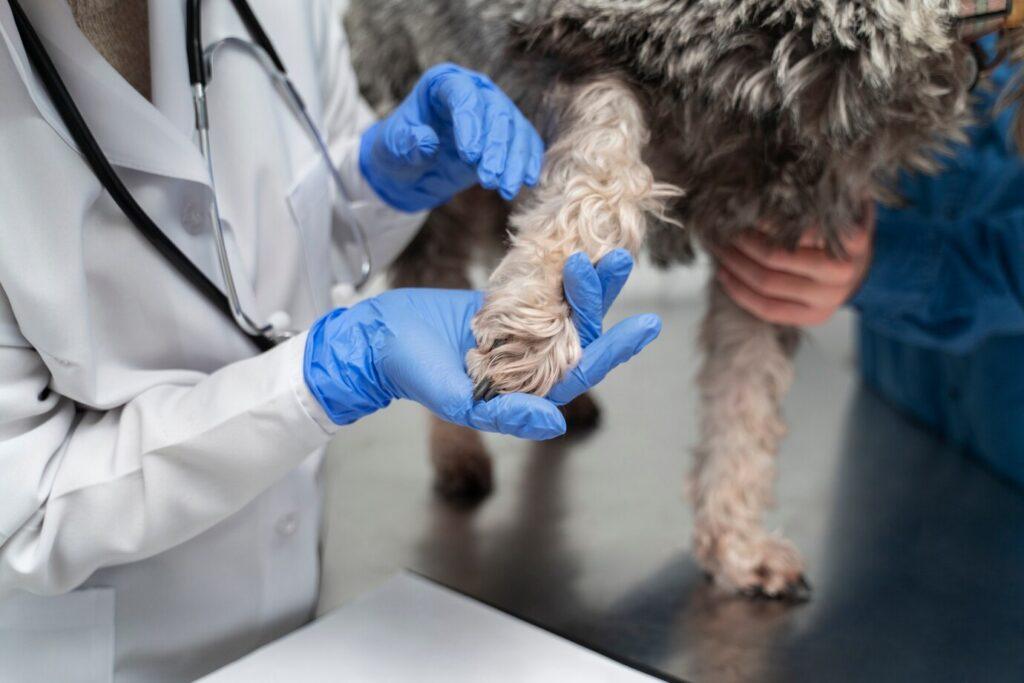As a dog owner, it’s important to stay vigilant about your pet’s skin health. Dogs in Nigeria are prone to various skin diseases, often due to the country’s hot, humid climate and exposure to environmental factors. In this comprehensive guide, we’ll explore 10 common dog skin diseases and conditions in Nigeria for 2025, their causes, symptoms, and effective prevention and treatment tips. With proper care, you can help maintain your dog’s healthy skin and comfort.
10 Common Dog Skin Diseases and Conditions in Nigeria
- Fleas and Ticks
- Hot Spots (Acute Moist Dermatitis)
- Allergic Dermatitis
- Ringworm (Fungal Infection)
- Dry, Flaky Skin (Seborrhea)
- Mange (Sarcoptic Mange and Demodectic Mange)
- Sunburn and Heat Rash
- Bacterial and Yeast Infections
- Scabies (Sarcoptic Mange)
- Hot Spots (Moist Dermatitis)
1. Fleas and Ticks
Fleas and ticks are among the most common external parasites affecting dogs in Nigeria. These parasites can cause itching, discomfort, and even more severe health problems.
Symptoms of Fleas and Ticks:
- Excessive scratching or biting at the skin
- Red, irritated skin or small bumps
- Visible fleas or ticks on your dog’s fur
Prevention and Treatment Tips:
- Use flea and tick prevention treatments such as spot-on treatments, oral medications, and flea collars.
- Regularly check your dog for fleas and ticks after outdoor walks.
- Wash your dog’s bedding and vacuum your home frequently.
2. Hot Spots (Acute Moist Dermatitis)
Hot spots are localized areas of skin irritation and infection that are often caused by excessive licking, scratching, or biting. They develop quickly and become red, inflamed, and painful.
Symptoms of Hot Spots:
- Red, moist, and inflamed patches of skin
- Intense itching and licking
- Hair loss around the affected area
Prevention and Treatment Tips:
- Keep your dog’s skin clean and dry, especially after swimming or bathing.
- Regular grooming can prevent matting and skin irritation.
- Seek veterinary treatment for proper diagnosis and medications.
3. Allergic Dermatitis
Allergic dermatitis occurs when a dog’s immune system reacts to environmental allergens, such as pollen, dust mites, or food. This condition is common in Nigeria, where seasonal allergens can trigger flare-ups.
Symptoms of Allergic Dermatitis:
- Persistent itching and scratching
- Red, inflamed skin, especially on the belly, paws, and ears
- Hair loss and scabs
Prevention and Treatment Tips:
- Identify and remove allergens from your dog’s environment.
- Use antihistamines or steroids under your vet’s advice to control allergic reactions.
- Bath your dog with an anti-itch shampoo to alleviate symptoms.
4. Ringworm (Fungal Infection)
Ringworm is a fungal infection that causes hair loss in patches, resulting in circular, scaly lesions. It’s highly contagious and can be transmitted to humans and other pets.
Symptoms of Ringworm:
- Round patches of hair loss with red, scaly skin
- Itching or irritation in the affected areas
- Lesions that may become crusty or scabbed
Prevention and Treatment Tips:
- Practice good hygiene, washing your hands after handling an infected pet.
- Treat affected pets with antifungal medications and topical ointments.
- Disinfect surfaces and bedding to prevent the spread of the fungus.
5. Dry, Flaky Skin (Seborrhea)
Dry skin is common in dogs, particularly those exposed to hot climates. Seborrhea is a condition that leads to dry, flaky skin and dandruff.
Symptoms of Dry, Flaky Skin:
- Dry, flaky patches or dandruff
- Itchy or scaly skin
- A dull coat or hair loss
Prevention and Treatment Tips:
- Ensure your dog stays hydrated and has access to fresh water.
- Use moisturizing shampoos for dogs with dry skin.
- Feed your dog a balanced diet rich in essential fatty acids to support skin health.
CHECK ALSO:
- Signs Your Pet Needs a Dental Checkup & How to Prevent Dental Issues
- Cost and Types of Dog Vaccination in Nigeria, 2025: Price & Schedule
- Top 10 24-Hour Veterinary Clinics in Lekki for 2025: Urgent Care for Pets
6. Mange (Sarcoptic Mange and Demodectic Mange)
Mange is caused by parasitic mites and can affect your dog’s skin. Sarcoptic mange is highly contagious, while demodectic mange usually affects puppies or dogs with weakened immune systems.
Symptoms of Mange:
- Red, inflamed patches with hair loss
- Intense itching and scratching
- Crusty lesions or scabs
Prevention and Treatment Tips:
- Regularly check your dog’s skin and treat any signs of mange early.
- Consult your vet for mite-fighting medications and treatments.
- Isolate infected dogs to prevent spreading sarcoptic mange.
7. Sunburn and Heat Rash
Dogs, particularly those with light-colored fur or short coats, are susceptible to sunburn and heat rash when exposed to prolonged sunlight.
Symptoms of Sunburn and Heat Rash:
- Red, inflamed skin on areas exposed to the sun (e.g., nose, ears, belly)
- Blisters or sores
- Excessive licking or chewing at the affected areas
Prevention and Treatment Tips:
- Limit your dog’s exposure to direct sunlight, especially during the hottest times of the day.
- Apply pet-safe sunscreen on your dog’s exposed skin.
- If sunburn or heat rash occurs, keep your dog cool and consult your vet for advice.
8. Bacterial and Yeast Infections
Bacterial and yeast infections can cause itching, irritation, and discomfort. Dogs with allergies, skin folds, or those who are immune-compromised are more prone to these infections.
Symptoms of Skin Infections:
- Red, irritated, and inflamed skin
- Pus or discharge from the affected area
- Foul odor from the skin
Prevention and Treatment Tips:
- Bathe your dog with antibacterial or antifungal shampoos.
- Clean your dog’s ears and skin folds regularly to prevent bacterial buildup.
- Consult your vet for appropriate antibiotics or antifungal treatments if an infection develops.
9. Scabies (Sarcoptic Mange)
Scabies is caused by a type of mite known as the Sarcoptes scabiei. This condition is highly contagious and causes intense itching, redness, and hair loss.
Symptoms of Scabies:
- Severe itching and irritation
- Red, inflamed skin, especially on the ears, elbows, and belly
- Hair loss and crusty lesions
Prevention and Treatment Tips:
- Isolate infected dogs to prevent spreading.
- Use prescribed treatments like topical medications and antiparasitic drugs.
- Seek immediate veterinary care if symptoms appear.
10. Hot Spots (Moist Dermatitis)
Hot spots are often caused by itching, licking, or scratching, which leads to skin irritation and infection. This condition can occur suddenly and become quite severe in humid climates like Nigeria.
Symptoms of Hot Spots:
- Red, inflamed patches that ooze pus
- Intense itching and licking
- Hair loss in the affected area
Prevention and Treatment Tips:
- Keep your dog’s skin clean and dry, especially after swimming.
- Prevent excessive licking by using an Elizabethan collar if necessary.
- Consult your vet for topical treatments, antibiotics, and pain relief.
Why Choose Dulham Veterinary Services for Your Dog’s Skin Care?
At Dulham Veterinary Services, we specialize in diagnosing and treating a variety of dog skin conditions. Our experienced team provides personalized care to ensure your dog’s skin stays healthy, whether they are dealing with a minor irritation or a more severe condition. We offer comprehensive skin care services, including examinations, treatments, and preventive care to help keep your dog’s skin in optimal condition.
Book Your Dog’s Skin Care Appointment Today!
If your dog is showing signs of a skin condition, don’t wait! Contact Dulham Veterinary Services today to schedule an appointment and get the best care for your pet’s skin. Visit Dulham Veterinary Services.
Visit Us
No 23 Crown Court Estate 2, Orunbe close , Oniru. Victoria Island, Lagos.
Phone Us
Mail Us
Frequently Asked Questions About Dog Skin Diseases in Nigeria
What are the common dog skin diseases in Nigeria?
The most common skin diseases in dogs in Nigeria include flea and tick infestations, hot spots, allergic dermatitis, mange, ringworm, and dry skin conditions.
How can I prevent skin diseases in my dog?
Prevention includes regular grooming, flea and tick treatments, using sun protection, maintaining a healthy diet, and providing regular veterinary checkups.
When should I take my dog to the vet for skin issues?
If your dog shows signs of itching, hair loss, red or inflamed skin, or develops sores, it’s important to take them to the vet for a thorough examination and treatment.
Are skin diseases in dogs contagious to humans?
Some conditions, like ringworm and mange, can be contagious to humans, while others are not. Always practice good hygiene when handling pets with skin conditions.
How can I treat my dog’s skin issues at home?
Many mild skin issues can be managed with proper grooming, flea treatments, and moisturizing shampoos. However, for more serious conditions, it’s essential to consult with your vet for the right treatment plan.

